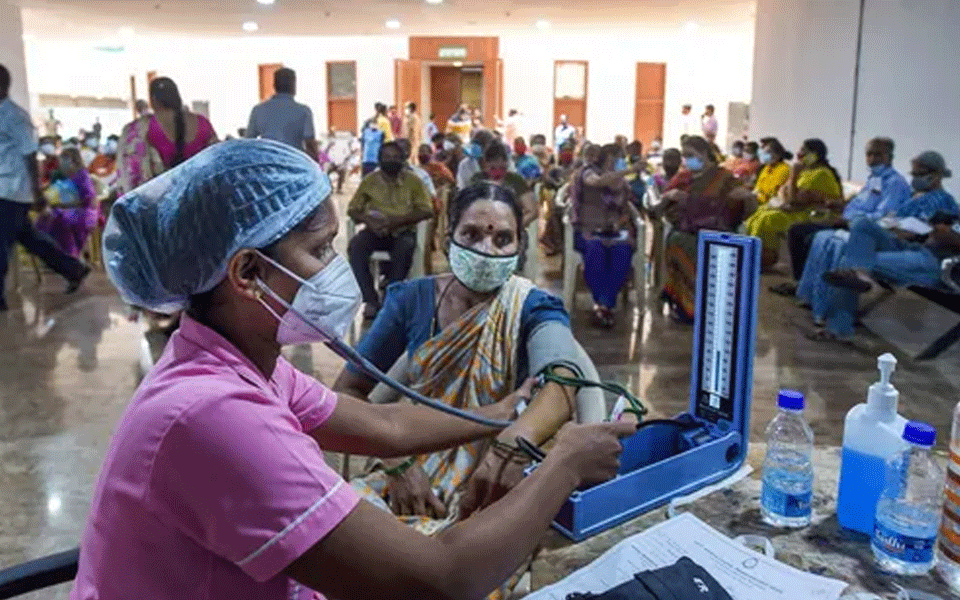New Delhi (PTI): Less than one-fourth of hypertensive patients in India have their blood pressure under control, according to a study published in The Lancet Regional Health journal.
Hypertension or high blood pressure is an important modifiable risk factor for cardiovascular diseases (CVD), making it one of the significant contributors of premature death and morbidity.
The team, including researchers from National Centre for Disease Control, New Delhi, and Boston University School of Public Health, US, conducted a systematic review of 51 studies published after 2001 that reported hypertension control rates in India.
The researchers focused on community-based non-interventional studies which provide a realistic picture of control rates at the community level.
They also examined the changes in control rates over the years, which the authors said, was never done before.
The research found that 21 studies (41 per cent) reported poorer hypertension control rates among males than females, and six studies (12 per cent) reported poorer control rates among rural patients.
The pooled hypertension control rate in India during 2001 2020 was 17.5 per cent -- with significant increase over the years, reaching 22.5 per cent in 2016 2020, the researchers said.
Sub-group analysis showed significantly better control rates in the South and West regions, and significantly poorer control rates among males. Very few studies reported data on social determinants or lifestyle risk factors, they said.
"Less than one-fourth of hypertensive patients in India had their blood pressure under control during 2016 2020. Although the control rate has improved compared to previous years, substantial differences exist across regions," the authors of the study said.
"Very few studies have examined the lifestyle risk factors and social determinants relevant to hypertension control in India," they added.
In the study, hypertension control rate was defined as the proportion of patients with their blood pressure under control ie. a systolic blood pressure less than 140 mmHg (unit of pressure) and diastolic blood pressure less than 90 mmHg.
The review included 49 cross-sectional and two cohort studies covering 1.39 million population (73 per cent females) including 338,313 (3.3 lakh) hypertensive patients. Thirty nine studies had state-specific data covering 15 states and territories.
The mean hypertension prevalence across studies was 24.2 per cent, and 46.8 per cent of them were aware of their high blood pressure.
The researchers noted that India needs to develop and evaluate sustainable, community-based strategies and programmes to improve hypertension control rates.
"Hypertension is a significant contributor to mortality in India. Achieving better hypertension control rate at the population level is critical in reducing cardiovascular morbidity and mortality," the authors said.
The team also included researchers from Government Medical College, Manjeri and KIMS Al-Shifa Specialty Hospital, Perinthalmanna, both in Kerala.
Let the Truth be known. If you read VB and like VB, please be a VB Supporter and Help us deliver the Truth to one and all.
Shillong (PTI): As the Meghalaya High Court pulled up the state government over the disappearance of over 4,000 tonnes of coal, a minister on Monday claimed that heavy rain in the state might have washed it away.
The high court has directed the state government to take action against officials under whose watch the coal went missing.
Speaking to reporters, Excise Minister Kyrmen Shylla said, "Meghalaya receives the highest rainfall. You never know... because of rain, the coal might have swept away. Chances are very high."
The high court had on July 25 pulled up the state government over the vanishing of coal from Rajaju and Diengngan villages and instructed it to trace those responsible for lifting the coal illegally.
The minister, however, clarified that he was not trying to justify the disappearance, and admitted there was no conclusive evidence yet to determine whether the loss was due to natural causes or any illegal activity. "I cannot blame just the rain. It could be or it could not be. I really don't have any kind of details," he said.
He asserted that any activity related to coal mining or transportation must be done in accordance with the law and that authorities must ensure illegal practices are curbed.
On allegations of ongoing illegal coal mining and transport in the state, Shylla said concrete evidence was needed to establish such claims and that multiple departments were responsible for monitoring such activities.
"But I believe that our people, if it is for survival, might do it illegally... otherwise nobody wants to do anything that can harm the state," he said.
He expressed optimism that people would abide by the law, especially after the government's announcement of scientific mining.
"We all are happy to welcome it, and we want to see the light of day with this. I believe our people will not do anything that gives the court or law a chance to point fingers at us," he added.
The ban on coal mining and transportation in Meghalaya was imposed by the National Green Tribunal (NGT) in 2014, citing rampant unregulated and unsafe mining practices, especially the controversial 'rat-hole' mining technique prevalent in the state.
The tribunal's order came in the wake of mounting concerns over environmental degradation, water contamination, and frequent fatalities in the hazardous mines, particularly in East Jaintia Hills.
On a separate note, the minister also responded to complaints over the dust and debris caused by the ongoing construction along National Highway 6 in East Jaintia Hills, saying, "I appreciate this government for the initiative. For now, it is difficult, but once everything is completed, we will enjoy the benefits."



